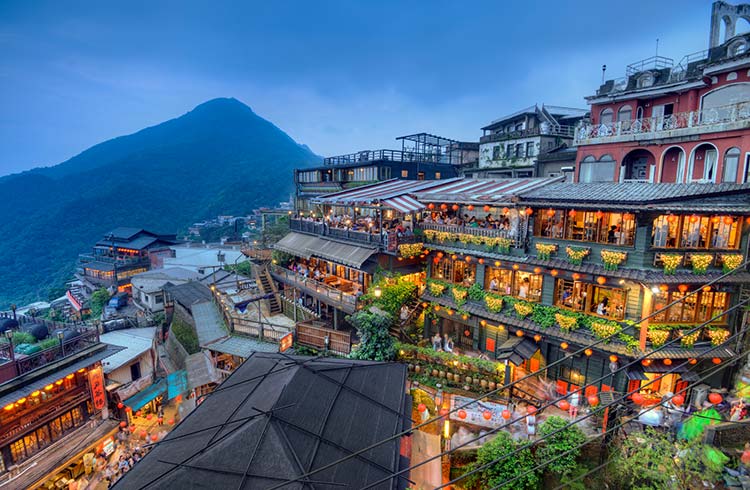How Safe is Taiwan? 8 Essential Travel Safety Tips
Taiwan is a modern, fast paced destination which welcomes visitors with a warm smile – but can you handle the crowds?
 Photo © Getty Images/Thant Zaw Wai
Photo © Getty Images/Thant Zaw Wai
The island of Taiwan (officially the Republic of China) is home to more than 23 million people, which is almost indistinguishable from the 1.3 billion just 100mi (160km) across the sea in China. In Taiwan they play baseball, have high-speed trains and enjoy democratic elections.
To some, Taiwan is an example of what China could have been if not for centralized government and Communism.
Here's everything you need to know to stay safe and avoid trouble in Taiwan.
1. Crime in Taiwan
The violent crime rate in Taiwan is low by world standards. However as Taiwan's population increases, slowly does the petty crime rate. The country has an extensive surveillance camera network in commercial and residential areas, which seems to be a deterrent for would-be criminals.
However, pickpocketing and bag snatching from both tourists and locals occasionally occurs, especially in busy tourist locations such as night markets. Take care of your belongings when traveling around busy places such as Tai-chung Railway Station – especially at night.
The seedy (and criminal) side of life is centerd around barber shops, massage businesses and nightclubs, which act as fronts for prostitution.
The dodgy businesses are pretty easy to spot. Legitimate businesses, like barber shops, openly advertise their business and you can see through the shopfront into the business. If you see a barber shop, but can't see into it to see the barber cutting hair, you're in the wrong place.
2. Taxi assaults in Taiwan
3. Natural disasters in Taiwan
Earthquakes
Earthquakes can strike at any time. In 2019 a 6.1 magnitude earthquake struck in Hualien County, killing one person and causing damage to weak buildings. In 2018 a 6.4 magnitude earthquake killed 17 people, and caused much more damage in Hualien city. Make sure you're aware of earthquake survival procedures, and have read the evacuation plan for your accommodation.
Typhoons
Typhoons strike the island every year from July to October. Make sure you know where the nearest typhoon shelter is located in the case of an emergency.
If you're on the road after a typhoon, look out for landslides which can be caused by the heavy downpours of rain.
4. Driving conditions
Taiwan's roads are congested, and motorcycles and scooters are very common. Many of them weave in and out of traffic making driving hazardous.
Watch out if you're a pedestrian crossing the road, drivers sometimes don't give way to those crossing the street. Always double check both ways before stepping off the kerb.
If you intend to drive in Taiwan you'll need an international driver's permit, and have it authorized at a vehicle registration center.
Take caution if you are driving down narrow streets, often there will be parked motorcycles and you don't want to start a domino effect by hitting any of those.
5. Medical facilities
The hospitals and clinics in Taiwan are pretty good. Many of the doctors and other medical staff have been trained overseas and can speak English.
Taiwan has a medical treatment scheme for citizens, but visitors will have to pay a fee for service. Because of the high standard of care, this could be expensive.
If you are admitted to hospital, contact your travel insurer as soon as you can.
If you receive a bill for treatment at a clinic, keep all receipts to present for a claim.
Be aware, ambulances in Taiwan are not usually staffed by paramedics.
6. Health and disease
Dengue Fever occurs in Taiwan. The mosquitoes responsible for transmitting the disease are active during the day. There is no vaccine, so prevention is the only cure. Avoid being bitten by using bed nets at night, wearing long, loose-fitting clothing and covering exposed skin in insect repellent.
It's best to avoid drinking tap water and ask that there is no ice put into your drinks.
If you go hiking in the mountains, beware of poisonous snakes. Snakes feel vibrations on the ground, and are more scared of you than you are of them. Chances are they will dart off before you see them, but if you are bitten by a snake, apply pressure above and below the wound to stop the venom from spreading (you could take your shoe laces out and tie one above and below the bite), and avoid panicking – when blood rushes around the body, the venom spreads faster. Stay calm and wait for medical help to arrive.
7. Getting help
Because of the international political situation regarding "two Chinas", many western nations do not officially recognize the Republic of China, choosing instead to have diplomatic relations with the People's Republic of China.
This means there are no embassies or consular services for many foreign visitors. Check with your government before you depart and ask them what arrangements are in place.
Even though your government might not be able to help, your travel insurance provider does operate in Taiwan.
8. Local customs
Not really a safety issue, but you can avoid a great deal of inconvenience if you observe the local custom known as "saving face" in Taiwan. Do not embarrass a local by making a scene. Do not make a spectacle of yourself. You'll find you get what you need if you approach the situation with calm and speak politely.
You'll also have a more relaxing holiday.
Simple and flexible travel insurance
You can buy at home or while traveling, and claim online from anywhere in the world. With 150+ adventure activities covered and 24/7 emergency assistance.
Get a quote
No Comments